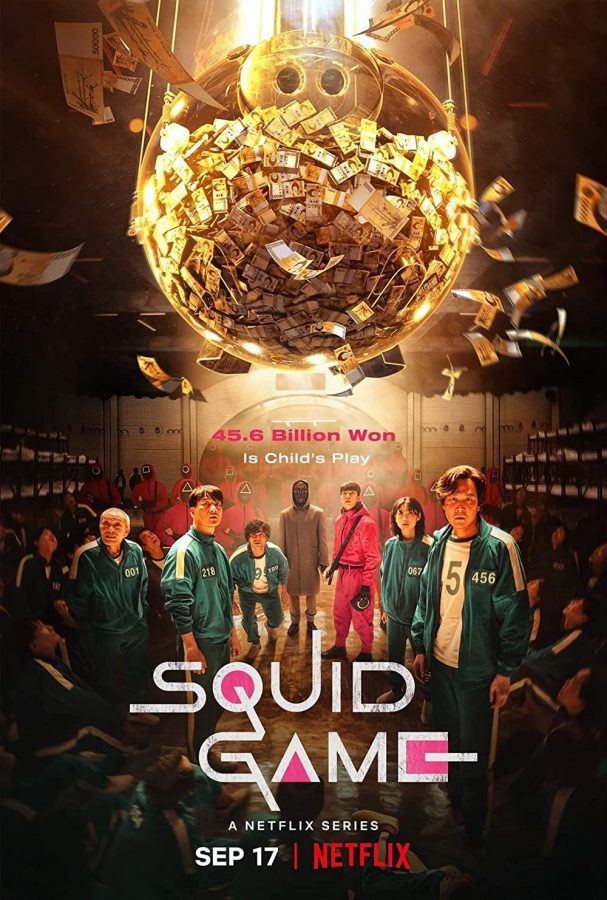Childhood fun turns deadly in “Squid Game”
November 9, 2021
This previously ran in our October 2021 print issue.
What if winning a playground game could make you rich? That’s the seemingly simple premise of Squid Game, a South Korean drama that’s taken Netflix — and the world — by storm.
Squid Game, directed by Hwang Dong-hyuk, starts with a mysterious offer to a desperate man to play childhood games for monetary rewards. The proposal quickly escalates, as it’s revealed that 456 people have been lured into a fatal contest, where they’re playing popular Korean children’s games for the chance to win ₩45.6 billion, or $38.7 million. In just the first episode, the screen gets splattered with blood after a lethal round of Red Light, Green Light, leaving the viewer shell-shocked for what’s next.
If you can stomach the events of the first episode, what follows are eight tightly woven chapters that are impossible to tear your eyes away from, even as it gets increasingly bloodthirsty. The games’ premises shift from simple playground amusements to all-or-nothing survival, quickly tearing the players who had previously teamed up together apart. Episode 6 is the emotional climax of the show; with shocking betrayals and depressing sacrifices alike. Plots à la Hunger Games and Battle Royale with coerced killing is nothing new, but Squid Game takes it to new heights — focusing on the character’s haunting decisions and setting it against the extremely realistic backdrop of wealth inequality.
Even as the stakes become drastic, what’s even more terrifying is the fact that hundreds of players have consented to participate. The characters find their lives outside of the game so horrifying that they’d rather risk imminent death than return empty-handed. The show’s lead, Seong Gi-hun, is a divorced, deadbeat gambler with a sickly mother. His childhood friend, Cho Sang-woo, is a scamming investment banker wanted by the police, going so far as to use his mother’s business as financial collateral for his downfall. Kang Sae-byeok is a North Korean defector, trying to retrieve her remaining family members across the border. Although each of the lead’s motivations get revealed at the start, they get discombobulated as dead bodies pile around them as high as the eye can see. Sang-woo in particular is one of the most interesting characters in recent television history. His actions, albeit initially seeming cruel and unjust, are simultaneously realistic for his situation. He exemplifies the desperate ends that humanity is capable of going to just for the sake of survival and wealth.
Therein lies the true purpose of Squid Game: a masterful critique of the fabricated sense of free will and fairness in a system that’s ultimately rigged for the ultrarich’s entertainment. Time and time again, the game masters push the message to the players that technically, as long as they work hard and put in their best effort, they’ll be rewarded. However, the truth is this: the players are not there out of sheer necessity, but because they want to be. The alternative is poverty at its worst: crushing debt, violent money-brokers, and extreme familial isolation. The players consent to participate, but not out of desire. It’s agreement, but under severe exploitation.
Watching Squid Games is incredibly uncomfortable. The urge to skip ahead certain parts to lessen the sense of dread is tempting. Even if you feel no emotional attachment to the characters, you can still derive a sort of sick voyeuristic pleasure from watching the players fall, much like the pawns on a chessboard.
With Squid Game on the track to being one of Netflix’s most popular shows yet, the topic of Asian representation in Hollywood comes to mind. In recent years, Hollywood has seen many Asian-led hits, from the similarly wealth-driven Parasite to Marvel’s Shang-Chi and the Legend of the Ten Rings. Although these are positive steps to greater inclusivity, the time has come for more. Asian representation must extend to more than just self-contained films that are either set in Asian countries or centered around Asian culture.
Squid Game is easily one of Netflix’s best. Its masterful synthesis of the carefree days of childhood with the crushing debts of adulthood keeps the viewer unable to turn their eyes away from the horrifying events that unfold. From the squirm-inducing games to the sharp social critiques, Squid Game is truly worthy of its success.











